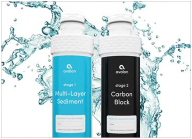
Hydration in Education: Drinking More Water Improves Test Scores
Humans are made up of about 60% water, so it’s no secret that hydration is an essential part of having a healthy and robust body, but also a highly functioning mind. For children, hydration also promotes an increased mental performance, which can help both in the classroom and during their overall development.
H2O and test scores
If you want to boost your child’s results in the classroom, then a simple glass of water may be the solution. Research by the University of East London suggests that children who drink water will experience an improvement in their fine motor skills and visual attention.
After examining five-dozen boys and girls, they found direct effects of water consumption linked to a higher academic performance. Researcher Dr. Caroline Edmonds explained that their findings “suggested that consuming water benefits cognitive performance in children.” According to their study, students who drank a glass of water before their test scored up to one third better than their counterparts.
Appetite—another research journal—reported on a group of kids with half who drank one cup of water before a test, while the other half didn’t. The students then took a memory and visual attention test 20 minutes after their water consumption, where the results showed that the water drinks scored 34% higher than those who didn’t. Additionally, they performed 23% better on a more difficult version of the memory test.
Of course, water isn’t a substitution for studying, but in addition to an increased cognitive function, kids also experience a higher physical performance when hydrated. These benefits directly impact the student in the classroom making them more alert, energetic, and able to focus.
Tips to keep your child hydrated
In school kids don’t usually drink an adequate amount of water. Sometimes this is due to school policies of preventing too many trips to the drinking fountain or simply a child’s forgetfulness. Dehydration in children is more common than in adults because their smaller bodies tend to hold less fluid and they are very active.
When children are dehydrated, their heads can ache or feel fuzzy, and their bodies get tired, along with many other negative symptoms. Being dehydrated is not conducive to students who are trying to pay attention or learn in the classroom, so it’s important to prevent.
1. Pack a water bottle in your child’s lunchbox or backpack so that they can sip on water all day long. Let them choose a water bottle that they like or let them decorate it, so they’ll be more likely to pull it out during school.
2. Encourage your child to drink water throughout the day. Kids tend to drink more water towards the end of the day when they’re already dehydrated.
3. For younger children, you can make a star chart or some sort of incentive to get them drinking more. Have them aim for six to eight glasses of fluid in a day, which should mainly be water though low-fat milk and some juices can also help meet this need.
4. Around 60% of children arrive at school lacking sufficient fluids, so you should make sure that your kid is drinking water before bed and when they wake up in the morning to start their day off right.
Hydration and mental performance conclusion
With all the running around kids do during the school day it’s easy for them to get dehydrated, and even easier for them not to drink water. Children tend to opt for sweeter drinks like juices or soda over water, leaving them thirsty and with low energy. Urge your child to drink more water at school and supply them with a water bottle, so they have access to fluids throughout the day. Before a big test encourage them to drink a little extra water, which could ultimately give them the boost they need to ace it.







